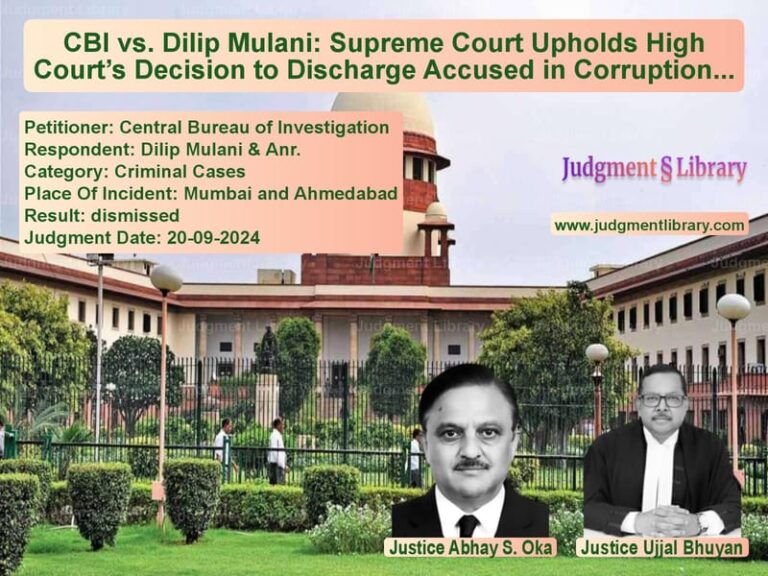Quashing of FIR in Abetment to Suicide Cases: Supreme Court’s Landmark Ruling
The Supreme Court of India recently ruled in Daxaben vs. The State of Gujarat & Ors., a crucial case concerning the quashing of an FIR under Section 306 IPC (Abetment to Suicide). The case revolved around the Gujarat High Court’s order that quashed a criminal complaint based on a private settlement between the accused and the informant. The Supreme Court’s decision has significant implications for criminal jurisprudence, particularly in cases involving serious offenses.
Background of the Case
The appellant, Daxaben, is the widow of late Shaileshkumar Chimanbhai Patel, who died by suicide on March 1, 2020, allegedly consuming poison at his office in Himmatnagar, Gujarat. The deceased had been under severe financial distress and had reportedly been harassed by individuals who had defrauded him in business transactions. Following his death, his cousin filed an FIR under Section 306 IPC against 12 accused persons, alleging that they had financially exploited the deceased, pushing him to take his life.
However, the Gujarat High Court quashed the FIR, reasoning that the dispute was primarily financial and that the complainant had reached a settlement with the accused. The appellant, being the widow of the deceased, challenged this order before the Supreme Court, arguing that the High Court had failed to consider her legal right to pursue justice for her husband’s death.
Petitioner’s Arguments (Daxaben)
The appellant, through her legal counsel, raised the following arguments:
- The High Court erred in quashing the FIR without giving the deceased’s wife a fair hearing. She had a stronger interest in the case than the complainant, a distant relative.
- The deceased had been financially cheated by the accused persons, leading to a monetary loss of Rs. 2.35 crores, which directly contributed to his suicide.
- The suicide note and call records explicitly mentioned harassment by the accused, establishing a direct link between their actions and the deceased’s suicide.
- Section 306 IPC is a serious, non-compoundable offense, which cannot be quashed on the basis of a private settlement between the accused and the informant.
- The High Court had exceeded its jurisdiction under Section 482 CrPC by interfering in an ongoing investigation and dismissing the case prematurely.
Respondent’s Arguments (The Accused)
The accused countered the allegations with the following claims:
- The case was primarily financial in nature and had been resolved through a private settlement with the informant.
- The informant, who had filed the FIR, had no objection to quashing the case, as the financial dispute had been amicably settled.
- The suicide note did not exclusively blame the accused and also referenced other personal and financial stressors.
- The High Court acted within its inherent powers under Section 482 CrPC to quash criminal proceedings in cases where settlement is reached.
Supreme Court’s Observations
The Supreme Court scrutinized the legal framework governing the quashing of criminal complaints under Section 482 CrPC and made several critical observations:
- Abetment to suicide is a grave criminal offense that cannot be nullified through a private financial settlement.
- The wife of the deceased had a legitimate right to be heard, and the High Court’s failure to do so was legally unjustified.
- Section 482 CrPC grants inherent powers to quash cases, but such powers should be exercised cautiously and in exceptional circumstances.
- Serious offenses such as abetment to suicide, murder, and rape should not be quashed merely because the informant agrees to withdraw the case.
Key Legal Precedents Considered
The Supreme Court referred to multiple landmark rulings, including:
- Gian Singh v. State of Punjab (2012): Held that serious offenses affecting societal interest should not be quashed through private settlements.
- State of Madhya Pradesh v. Laxmi Narayan (2019): Differentiated between private disputes and crimes with public impact.
- State of Maharashtra v. Vikram Anantrai Doshi (2014): Declared that economic offenses require strict scrutiny and cannot be quashed merely on settlement.
- CBI v. Maninder Singh (2016): Held that cases affecting the financial system should not be settled to avoid a dangerous precedent.
Final Judgment
The Supreme Court ruled as follows:
- The FIR under Section 306 IPC should not have been quashed.
- Financial settlements cannot override criminal prosecution in grave and non-compoundable offenses.
- The case must be reinvestigated, allowing the wife of the deceased to participate in legal proceedings.
Implications of the Ruling
This ruling sets a crucial precedent in criminal jurisprudence:
- Courts must ensure victims and close family members are heard before quashing serious criminal complaints.
- Abetment to suicide is a serious crime, and financial settlements cannot absolve accused persons.
- High Courts must use their powers cautiously and in line with public interest.
This decision strengthens victim rights in criminal cases and prevents the misuse of financial settlements to escape criminal liability.
Petitioner Name: Daxaben.Respondent Name: The State of Gujarat & Ors..Judgment By: Justice Indira Banerjee, Justice V. Ramasubramanian.Place Of Incident: Himmatnagar, Gujarat.Judgment Date: 13-07-2022.
Don’t miss out on the full details! Download the complete judgment in PDF format below and gain valuable insights instantly!
Download Judgment: daxaben-vs-the-state-of-gujarat-supreme-court-of-india-judgment-dated-13-07-2022.pdf
Directly Download Judgment: Directly download this Judgment
See all petitions in Suicide Cases
See all petitions in SC/ST Act Case
See all petitions in Custodial Deaths and Police Misconduct
See all petitions in Judgment by Indira Banerjee
See all petitions in Judgment by V. Ramasubramanian
See all petitions in allowed
See all petitions in Quashed
See all petitions in supreme court of India judgments July 2022
See all petitions in 2022 judgments
See all posts in Criminal Cases Category
See all allowed petitions in Criminal Cases Category
See all Dismissed petitions in Criminal Cases Category
See all partially allowed petitions in Criminal Cases Category







